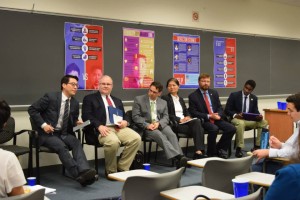Georgetown University Brings Together Activists for Human Rights in North Korea
On April 18, Truth and Human Rights in North Korea (THiNK), a student advocacy group at Georgetown University, hosted their second annual conference for human rights in North Korea. With academics, activists, legal experts, and a defector from North Korea participating, the THiNK conference examined the changes and progress on human rights in North Korea since the publication of the UN Commission of Inquiry (COI) report in 2014. Based on testimonies of North Korean defectors, the UN COI report is the most comprehensive report on North Korea’s “systemic, widespread, and grave human rights violations.”

The conference began with a keynote address by Ambassador Robert King, the U.S. Special Envoy for Human Rights in North Korea. Ambassador King praised the COI report for its detailed examination of North Korea’s inhumane practices such as prohibition of movement, public executions, incarceration without fair trials, and torture in prison camps . Despite working with very limited resources, the report successfully compelled foreign nations to act upon these atrocities, and to make tremendous achievements in the past year. After the publication of the report on February 7th, 2014, an overwhelming majority of states in the Human Rights Council voted to refer this issue to the UN Security Council, which in turn officially discussed North Korea’s human rights issue for the first time. King also noted that North Korea sent a delegation to the United Nations General Assembly for the first time in fifteen years to defend themselves against the accusations of human rights violations. Although China and Russia, the two closest countries to North Korea, would likely ultimately veto the recommendation to refer Kim Jong-un to the International Criminal Court, King was optimistic that these small changes would eventually bring an end to the atrocities in North Korea.
The second keynote speaker, Suzanne Scholte, a long-time activist and the founder of the North Korea Freedom Coalition, presented a different perspective on the human rights crisis in North Korea. While King focused on political initiatives in the past year, Scholte lauded non-governmental activists who had steadily worked in this field, even in the 1990s and early 2000s, when both the U.S and South Korea solely focused on the denuclearization of North Korea and downplayed the human rights issues. She urged the U.S. and South Korean governments to use human rights as their talking points to push North Korea towards a positive change, stating that empowering the North Korean people would effectively bring an end to the Kim regime. Considering the increasing flow of information penetrating North Korea, Scholte believes that internal changes in Pyongyang are imminent.
Scholte’s argument was largely reflected during the panel discussion in the second half of the conference. Consisting of Dan Aum of the Robert Kennedy Center of Justice, David Maxwell of Georgetown University, Joshua Stanton of FreeKorea.us, Grace Kang, and Greg Scarlatoiu of the U.S Committee of Human Rights in North Korea, the panelists discussed a wide range of topics, mainly focusing on the future of North Korea. Maxwell, one of the panelists, suggested that China would block any external influence to change North Korea in hopes of maintaining the regional status quo. Therefore, the fall of the regime and peaceful unification with South Korea would depend solely on changes within North Korea by its people. Stanton pointed out that North Korea’s recent, strongly defensive response to the COI report showed that human rights was indeed the weak point of the Kim regime .
The conference concluded with a North Korean defector-turned-activist, Joh Jinhye, who told her story of escaping North Korea, being tortured in prison camps, and finally finding a new life in the United States. Joh currently resides in Virginia, and operates an organization that rescues orphans from North Korea. While expressing gratitude for the freedom she could enjoy in the United States, Joh also pleaded for more attention and assistance to the suffering people in North Korea.
In an interview after the conference, Shaquille James (COL’ 16), the President of THiNK expressed appreciation to the organizers of the conference for months of hard work, and hoped that the conference had “redirected and re-framed the discussion on North Korea.” James noted ,“in the past, the discussion on North Korea focused almost exclusively what has been done—on the past. Slowly but surely, however, the discussion is shifting towards what needs to be done and what could and should occur in going forward.” These are the questions that have yet to be answered. However, one thing is certain: there is not a single actor who can stop the state-sponsored persecutions in North Korea. These human rights atrocities will only end when all governments and non-governmental actors work together to put pressure on the Kim regime and to empower North Korean citizens.
